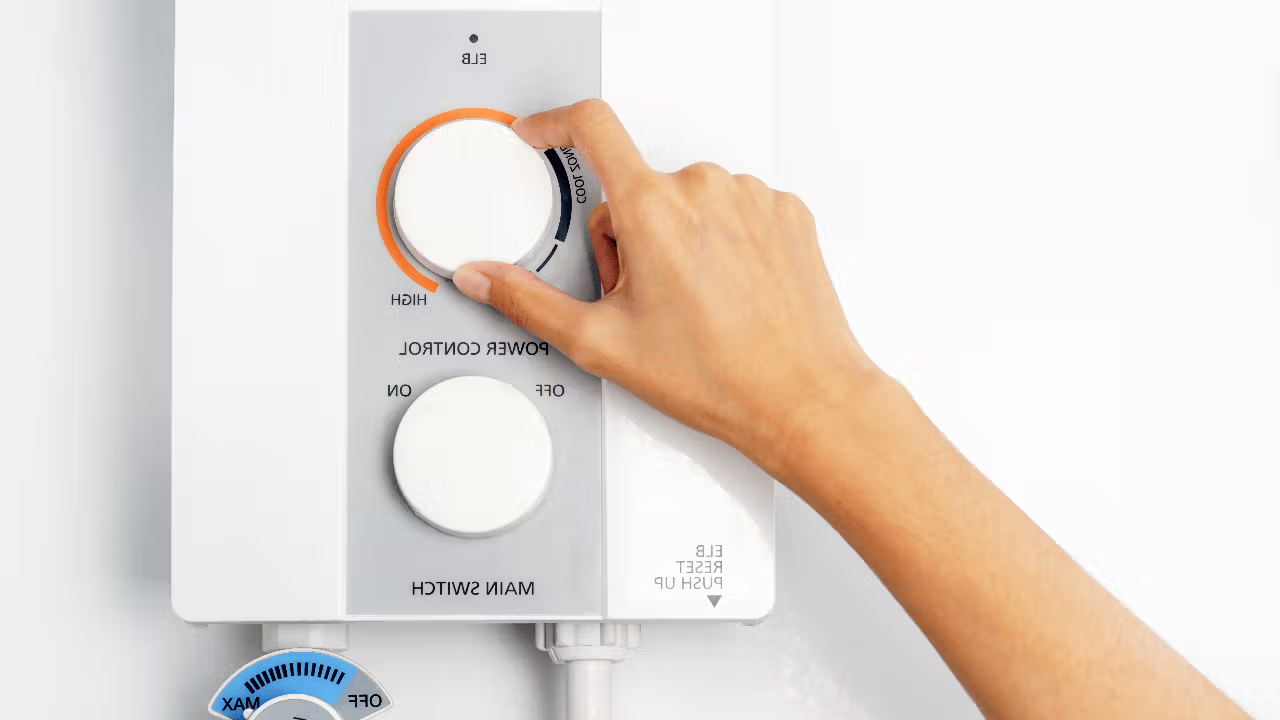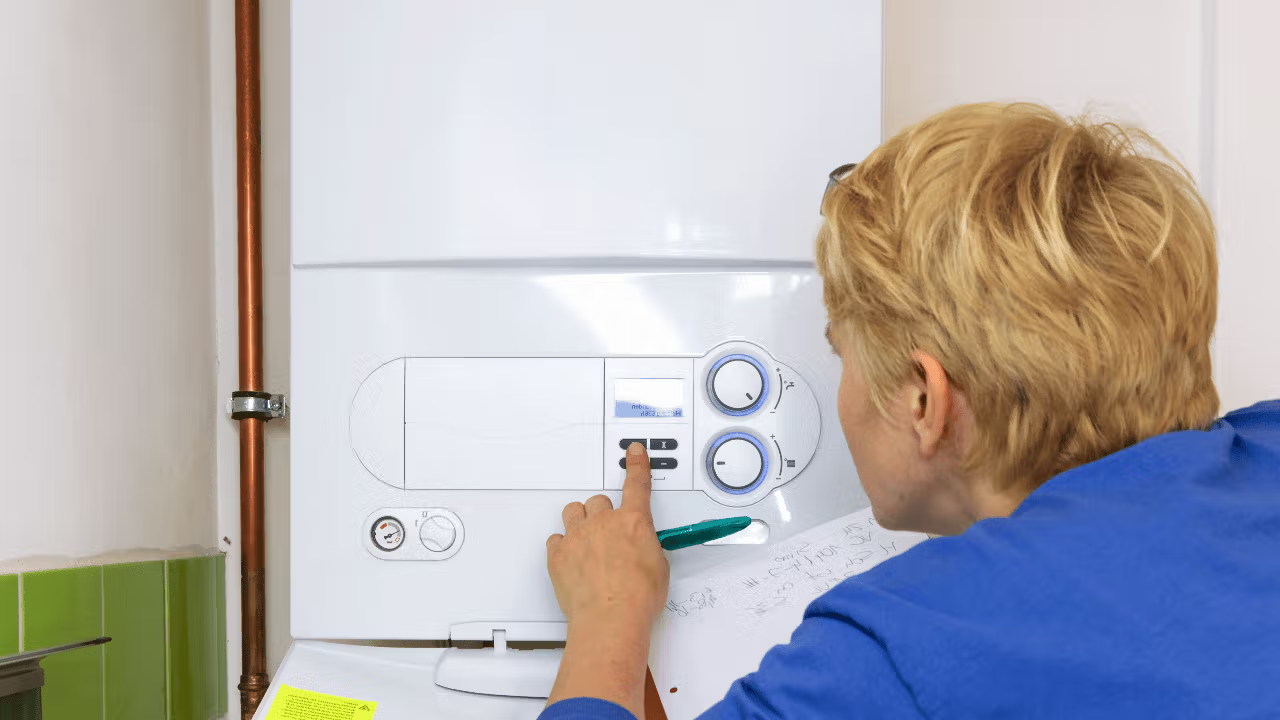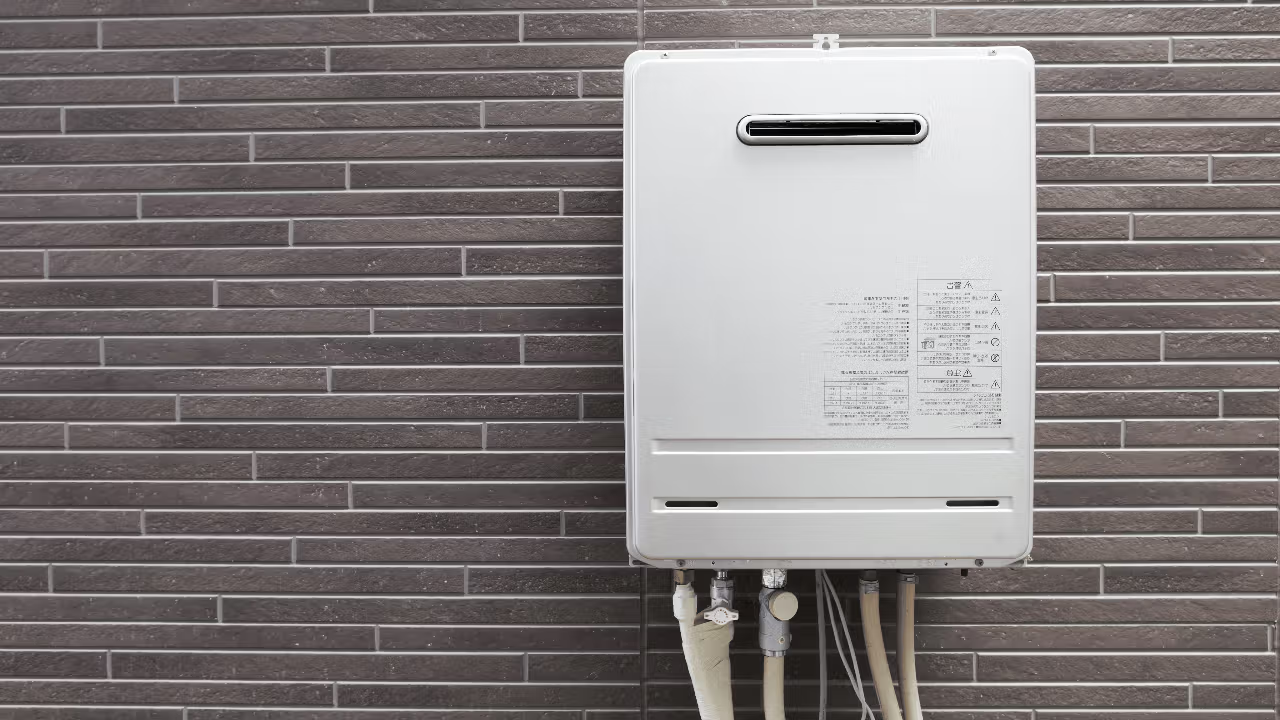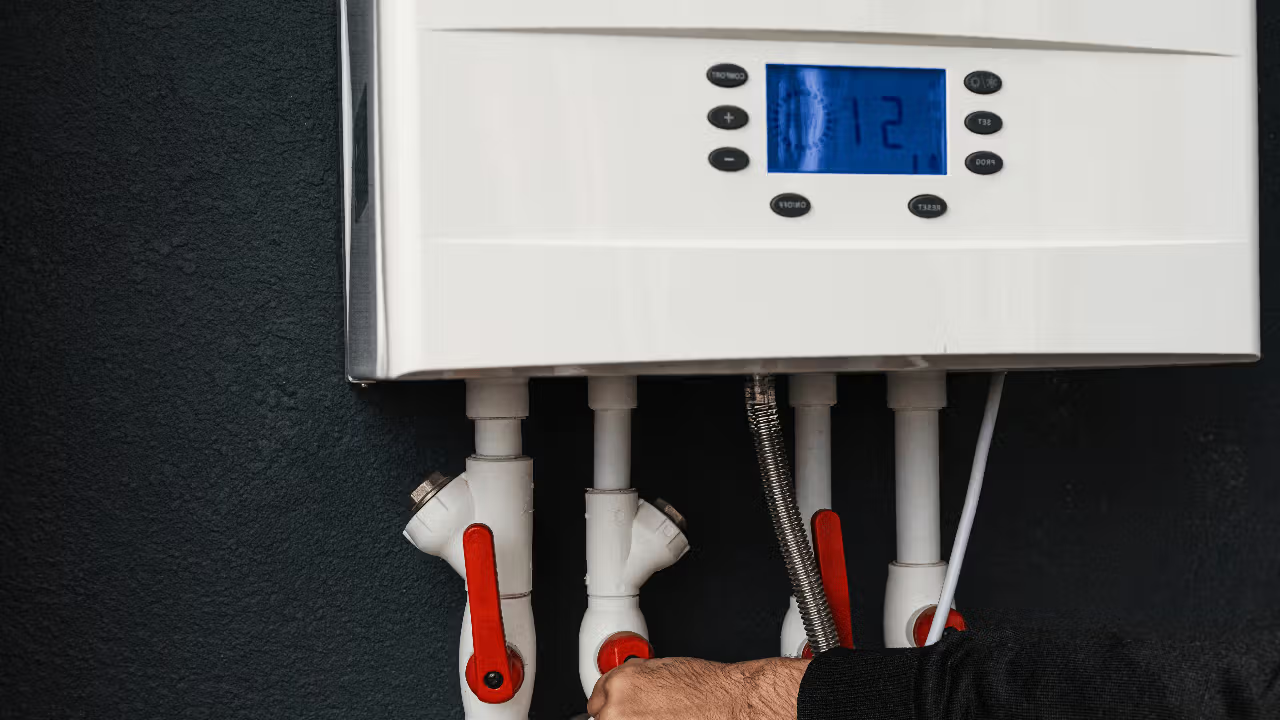How Does a Tankless Water Heater Work: All You Need To Know
By HeyHome • December 15, 2023

What is a Tankless Water Heater?
The Rising Popularity of Tankless Water Heaters
Tankless water heaters, often referred to as on-demand or instant hot water heaters, have gained significant popularity in recent years. Unlike traditional water heaters with storage tanks, a tankless water heater heats water directly as it flows through the device, providing hot water on demand without the need for a large tank. This innovative approach not only saves space but also enhances energy efficiency, as it eliminates the need to constantly heat and reheat water in a storage tank. The technology behind tankless heaters represents a significant advancement in the way we use and conserve energy in our homes, offering a more sustainable and cost-effective solution for hot water needs.
Join our newsletter
Stay on top of the latest in landscaping and lawn care with one valuable tip right in your inbox every Saturday morning.
How Does a Tankless Water Heater Work?
The Basics of Tankless Water Heating Technology
Tankless Water Heaters vs Traditional Water Heaters
To understand how a tankless water heater works, it's essential to know the differences between tankless and traditional models. Traditional water heaters use a large storage tank to heat and hold hot water, often resulting in energy loss due to standby heat. In contrast, tankless water heaters eliminate the need for a storage tank by heating water directly as it flows through the unit.
When a hot water tap is turned on, cold water travels through a pipe and into the tankless water heater. Here, either a gas burner or an electric element heats the water. This on-demand process ensures that hot water is always available without the wait time and energy loss associated with heating a large tank of water. The efficiency of this process means tankless water heaters can deliver a constant supply of hot water, making them a more energy-efficient and convenient choice for modern homes.
Tankless heaters provide numerous benefits over traditional models, primarily in energy conservation and continuous hot water supply. Understanding these differences is key to appreciating the technology behind tankless water heating and its impact on daily life.
The Mechanics of Tankless Water Heaters
Tankless Water Heater Components
How Water is Heated On-Demand
The mechanics of tankless water heaters are relatively straightforward yet technologically advanced. At the core of a tankless water heater are key components such as the heat exchanger, water flow sensors, and heating elements (either electric or gas burners). When a hot water tap is opened, the flow sensors detect the movement of water, triggering the heating element to activate.
In gas tankless heaters, a gas burner quickly heats the heat exchanger, which in turn heats the water as it passes through. In electric models, electrical resistance heating coils perform this heating role. The heat exchanger efficiently transfers the heat to the water, rapidly bringing it up to the desired temperature. As soon as the tap is closed, the system shuts off, conserving energy by not heating water unnecessarily. This on-demand heating mechanism is what makes tankless water heaters so efficient, ensuring hot water is available instantly and continuously, without the standby energy losses associated with traditional tank heaters.

Types of Tankless Water Heaters
Gas or Electric Tankless Water Heaters
Pros and Cons of Each Type
Tankless water heaters come primarily in two types: gas-fueled and electric. Both have their unique advantages and considerations.
Gas Tankless Water Heaters use a gas burner to heat water and are generally more powerful than electric models, making them ideal for larger households with higher hot water demands. They can be more energy-efficient and have lower operational costs if natural gas is cheaper than electricity in your area. However, they typically require venting outdoors and may have higher installation costs due to the need for gas lines.
Electric Tankless Water Heaters, on the other hand, are known for their compact size and easier installation, as they do not require venting. They are perfect for smaller households and places where installing a gas line is impractical. While they are less powerful compared to gas models, they are usually more energy-efficient and have lower upfront costs. However, the cost-effectiveness can vary depending on local electricity rates.
Choosing between gas and electric tankless heaters depends on your household's specific needs, energy availability, and budget considerations.
Energy Efficiency and Environmental Impact
Conserving Energy With a Tankless Gas Water Heater
Energy Efficiency of Tankless On-Demand Hot Water Heaters
Energy efficiency is a hallmark of tankless water heaters, both gas and electric models. These heaters only operate when hot water is needed, significantly reducing energy consumption compared to traditional storage tank heaters that continuously heat and reheat water.
Tankless gas water heaters, equipped with a gas burner, are highly efficient as they deliver hot water instantly and cease operation as soon as the demand is met. This on-demand heating means no standby energy loss, translating to lower energy costs and savings for homeowners over time. Additionally, many modern tankless gas heaters are designed with advanced condensing technology, which recovers extra heat to increase overall efficiency.
The environmental impact of these heaters is also noteworthy. By reducing energy usage, tankless water heaters contribute to lower carbon emissions, aligning with eco-friendly home practices. Their energy-efficient operation and potential to save money on energy bills make tankless water heaters an appealing choice for environmentally conscious consumers.
Installation and Maintenance
Installation & Maintenance Requirements
Why Professional Installation Matters
Installing a tankless water heater involves unique requirements, differing significantly from traditional tank-based systems. One key aspect is ensuring the unit is properly sized to meet the hot water demands of your home. A professional installation is crucial, as it often involves handling gas lines, venting systems (for gas heaters), and electrical circuits (for electric heaters).
Professional installation ensures that the tankless system operates safely and efficiently. It also helps in complying with local building codes and manufacturer's warranty requirements. Experts can adequately address technical aspects such as gas pressure, venting requirements, and electrical load, which are critical for optimal performance and safety.
Maintenance is equally important for the longevity of your tankless water heater. Regular descaling to prevent mineral buildup, especially in areas with hard water, and annual checkups are recommended. Proper maintenance can extend the life of the unit and maintain its efficiency over time.

Understanding the Capacity and Output
Tankless Water Heaters' Flow Rates
Btus Output Estimate
When considering a tankless water heater, understanding its capacity and output is crucial. The flow rate, measured in gallons per minute (GPM), is a key factor. It determines the amount of hot water the heater can provide at any given time. Different models offer varying flow rates, typically ranging from 2 to 5 GPM. Higher flow rates are necessary for larger households with simultaneous hot water needs.
Another important metric is the British Thermal Unit (BTU) output, which measures the energy used to heat water. Tankless heaters generally range from 140,000 to 200,000 BTUs, with higher BTUs indicating greater heating capacity. This capacity must be matched to your home's demand for hot water to ensure efficient operation. Selecting the right combination of flow rate and BTU output is essential for a tankless water heater to meet your hot water needs effectively and efficiently.
Advantages of Tankless Water Heaters
Continuous Hot Water Supply
Space Saving and Compact Design
One of the most significant advantages of tankless water heaters is their ability to provide a continuous supply of hot water. Unlike traditional heaters with limited tank capacity, tankless heaters heat water on demand, ensuring that hot water never runs out. This feature is especially beneficial for large families or households with high hot water usage, providing a constant flow of hot water for showers, appliances, and other needs without the wait.
Additionally, tankless water heaters boast a space-saving and compact design. Without the bulky storage tank, these heaters can be installed in smaller spaces, such as closets or under sinks, freeing up valuable space in the home. This compactness is particularly advantageous for smaller homes or apartments where space is at a premium. The combination of continuous hot water supply and space efficiency makes tankless water heaters a smart choice for modern living.
Addressing Common Questions and Concerns
Do You Run Out of Hot Water with a Tankless Water Heater?
Why Might a Shower Get Cold with a Tankless Water Heater?
A common question about tankless water heaters is whether they can run out of hot water. Unlike traditional tank heaters, tankless models heat water on demand, meaning they can provide hot water continuously. However, their flow rate limit can be a factor; if multiple appliances or showers are used simultaneously, it might exceed the heater's capacity to supply enough hot water.
Another concern is why a shower might suddenly turn cold when using a tankless water heater. This can occur if the heater's minimum flow rate isn't met, which can happen when switching between hot and cold water during a shower, leading to temporary interruption of heating. Also, if the water heater is undersized for the home's needs, it may struggle to supply consistent hot water during peak usage. Proper sizing and understanding the unit’s capabilities are crucial to avoid these issues and ensure a steady supply of hot water.
Join our newsletter
Stay ahead of the curve in all things outdoor.
Get the inside scoop on the latest landscaping, lawn care, and fencing trends with 1 actionable tip every Saturday morning.
Troubleshooting and Resolving Issues
Common Issues with Tankless Water Heaters
Tips for Maintaining Your Tankless Water Heater
Even with their efficiency and reliability, tankless water heaters can encounter issues. Common problems include fluctuating water temperatures, reduced flow rates, and system overload. These issues are often due to mineral buildup inside the unit, especially in areas with hard water. System overload can occur when the demand for hot water exceeds the heater's capacity.
Regular maintenance is key to preventing and resolving these issues. It's recommended to descale and clean the unit annually to remove mineral buildup. This can be done using a vinegar solution to flush the system, a process that can be performed by homeowners or professional technicians. Also, ensuring that the unit is sized correctly for your home's water usage can prevent overload and maintain consistent performance. Regularly monitoring and maintaining your tankless water heater will help keep it functioning efficiently and extend its lifespan.

Comparing Tankless and Traditional Water Heaters
Pros and Cons of Tankless Water Heaters
Which is Better: Tankless or Traditional?
When comparing tankless and traditional water heaters, each has its advantages and disadvantages. Tankless water heaters are renowned for their energy efficiency, as they heat water on demand and eliminate standby heat loss associated with storage tanks. This efficiency can translate to lower energy bills over time. They also offer a continuous supply of hot water and have a longer lifespan, typically around 20 years.
However, tankless heaters usually have higher upfront costs, both in terms of the unit and installation, particularly for gas models requiring venting. Traditional water heaters, while less expensive upfront and simpler to install, are less energy efficient due to the constant heating of the stored water. They also take up more space and have a shorter lifespan, around 10-15 years.
The choice between tankless and traditional depends on individual needs, budget, space considerations, and long-term savings goals. Tankless models are ideal for energy-conscious consumers with higher initial budget flexibility, while traditional heaters might suit those with immediate budget constraints.
Making the Switch to Tankless
Evaluating the Costs and Benefits
Is Switching to a Tankless Water Heater Worth It?
Deciding to switch to a tankless water heater involves weighing the initial costs against long-term benefits. While the upfront cost of purchasing and installing a tankless heater is higher than that of traditional models, the investment can be cost-effective in the long run. Tankless heaters typically have a longer lifespan, up to 20 years, and offer significant energy savings by heating water only on demand. This reduction in energy usage can lead to noticeable savings on energy bills.
In addition to cost savings, the switch to a tankless system offers the benefit of continuous hot water supply and a smaller unit footprint, ideal for homes with limited space. For households with high hot water usage or those looking to improve their home's energy efficiency, making the switch to a tankless water heater can be a worthwhile investment. However, it's important to consider individual circumstances, including water usage patterns and budget, to determine if switching to tankless is the right decision for your home.

Future of Hot Water: Tankless Water Heaters
Innovations in Tankless Water Heating Technology
The Future Outlook for Tankless Water Heaters
The future of hot water heating is leaning increasingly towards tankless technology, with ongoing innovations making these systems more efficient, user-friendly, and adaptable to different homes. Advances in technology are continually improving the energy efficiency of tankless water heaters, reducing carbon footprints and energy bills. Smart technology integration allows for remote monitoring and control, enhancing user convenience and system management.
The outlook for tankless water heaters is promising, as they align with global trends toward energy efficiency and sustainable living. The increasing focus on reducing energy consumption and the desire for compact, efficient appliances in homes is driving the market growth. As technology evolves, we can expect to see tankless heaters becoming even more efficient and widespread, possibly incorporating renewable energy sources like solar power. The shift towards tankless water heating is not just a trend but a significant move towards more sustainable and efficient home heating solutions.
Conclusion: Why Choose a Tankless Water Heater?
Summarizing the Benefits of Tankless Water Heaters
Making an Informed Decision for Your Home
In conclusion, tankless water heaters offer a range of benefits, making them a smart choice for many homeowners. Their energy efficiency, continuous hot water supply, and space-saving design are compelling advantages. While the initial investment is higher, the long-term savings and convenience are significant. As you consider upgrading your home's water heating system, weigh these benefits against your specific needs and circumstances. Ultimately, choosing a tankless water heater can lead to cost savings, increased comfort, and a positive step towards energy-efficient living.
Join our newsletter
Stay ahead of the curve in all things outdoor.
Get the inside scoop on the latest landscaping, lawn care, and fencing trends with 1 actionable tip every Saturday morning.